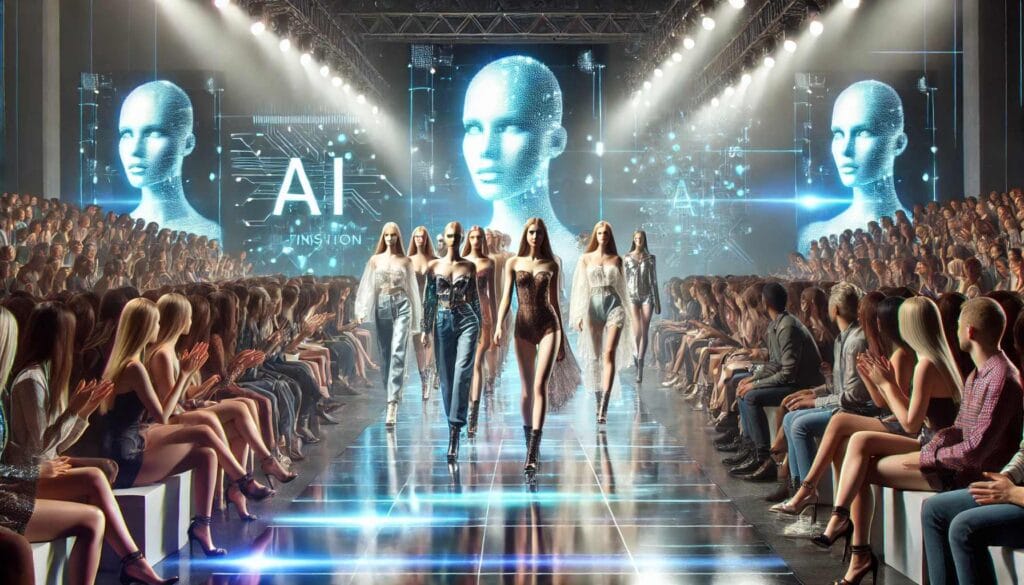The Impact of AI on the Fashion and Modeling Industry

The fashion and modeling industry has always been a dynamic and rapidly evolving sector, but the introduction of Artificial Intelligence (AI) is accelerating these changes at an unprecedented pace. From designing garments to marketing strategies and predicting trends, AI is reshaping every facet of the industry. Let’s dive into the profound impact AI is having on fashion and modeling.
1. Revolutionizing Design and Creativity
AI-powered design tools are enabling fashion designers to push the boundaries of creativity. Algorithms can analyze vast data sets, including historical fashion trends, consumer behavior, and even art history, to generate unique and innovative designs. Designers are using AI to experiment with different fabric patterns, colors, and textures. AI assists in rapid prototyping, reducing time and cost, and allowing designers to focus more on creativity and less on repetitive tasks.
Moreover, AI-based generative design models, like GANs (Generative Adversarial Networks), are now capable of creating fashion items autonomously. These models can produce designs that are not only aesthetically appealing but also functionally optimized, creating a blend of fashion and technology never seen before.
2. Personalized Shopping Experiences
One of the significant advantages AI brings to the fashion industry is personalization. Brands are using AI to analyze consumers’ past purchases, browsing history, and preferences to offer personalized shopping experiences. From recommending outfits tailored to individual tastes to creating virtual try-ons, AI is making shopping more engaging and efficient.
Virtual stylists powered by AI can curate personalized outfits, suggesting items that fit a customer’s style, body type, and even the occasion. This has revolutionized how people shop, making the process more convenient and reducing the need for physical trials.
3. AI in Modeling and Virtual Influencers
The modeling industry has seen a significant transformation with the advent of AI. Virtual influencers like Lil Miquela, a computer-generated character, have amassed millions of followers on social media and are collaborating with top fashion brands. These AI-driven models are redefining the concept of beauty standards and diversity. Brands are exploring the potential of digital models for campaigns, as they offer complete creative control and never age, tire, or demand high fees.
However, this raises questions about the future of human models and the balance between real and virtual representation. While AI models provide convenience and cost savings, there’s still a human touch and authenticity that many argue cannot be replicated by machines.
4. Enhanced Supply Chain and Sustainability
AI is playing a crucial role in making the fashion industry more sustainable. By optimizing supply chains, AI helps reduce waste and improve efficiency. Predictive analytics enable companies to forecast demand accurately, minimizing overproduction and unsold inventory. AI can also monitor the use of resources, suggesting more sustainable production methods and sourcing materials responsibly.
AI-driven insights are guiding brands toward more eco-friendly practices, from fabric selection to energy consumption in manufacturing. This is crucial at a time when the fashion industry faces scrutiny for its environmental impact.
5. Trend Prediction and Market Insights
AI excels in analyzing vast amounts of data to predict trends and consumer preferences. By scanning social media platforms, online searches, and consumer behavior, AI can forecast what will be “in” next season. Fashion houses and retailers leverage these insights to stay ahead of trends, reducing the risk of failed collections.
This level of predictability is invaluable for fashion brands, allowing them to make data-driven decisions about designs, marketing strategies, and inventory management. AI can even identify micro-trends in niche markets, ensuring that brands cater to specific audiences effectively.
6. Marketing and Customer Engagement
AI-driven marketing strategies have become more prevalent, with chatbots, personalized emails, and targeted advertising transforming how brands connect with consumers. Machine learning algorithms analyze customer interactions to create hyper-targeted marketing campaigns, boosting engagement and sales.
Moreover, brands are using AI to monitor and analyze consumer sentiment on social media, adapting their strategies based on feedback and emerging trends. AI also powers immersive experiences like augmented reality (AR) fashion shows and virtual fitting rooms, making consumer engagement more interactive and memorable.
Challenges and Ethical Considerations
While AI offers numerous benefits, it also presents challenges and ethical concerns. The use of virtual models raises questions about job displacement for human models and the perpetuation of unrealistic beauty standards. There are also concerns about data privacy, as AI relies on collecting and analyzing vast amounts of personal information.
Furthermore, the fashion industry must address the environmental impact of training large AI models, which consume significant energy. Balancing the advantages of AI with ethical and sustainable practices is an ongoing challenge for the sector.
Conclusion
AI is undeniably transforming the fashion and modeling industry, bringing about innovation, efficiency, and new forms of creativity. From automating design processes to offering personalized shopping experiences and creating virtual models, AI is setting new standards. However, the industry must navigate the ethical implications and ensure that technology enhances, rather than replaces, human creativity and talent.
As AI continues to evolve, the future of fashion and modeling will likely be a blend of technology and artistry, offering endless possibilities for innovation.
Source : Medium.com




